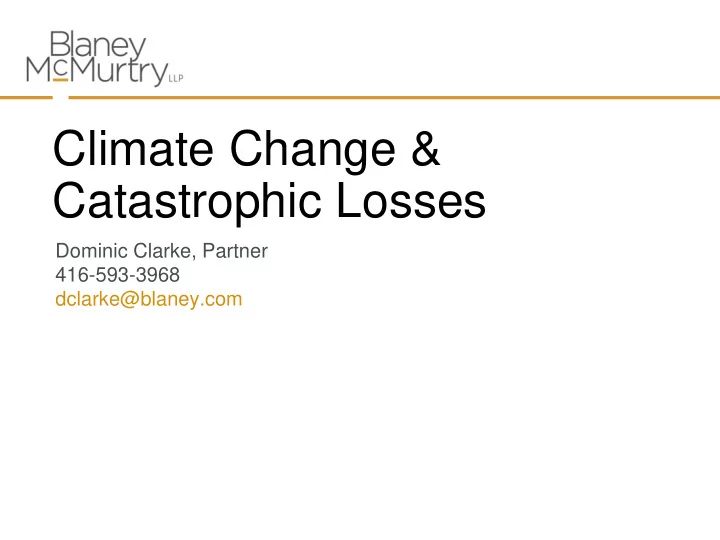

Climate Change & Catastrophic Losses Dominic Clarke, Partner 416-593-3968 dclarke@blaney.com
Fort McMurray Fires Insured losses stemming from the fires have been estimated at approximately $4 billion 45,000 claims had been tendered to insurers seeking coverage for fire losses 2016’s $210 billion in losses from natural catastrophes one of the highest totals on record Climate Change to Blame?
Climate Change and Coverages Property Business Interruption Environmental Liability Personal Injury Municipal Liability Professional Errors & Omissions Product Liability
Climate Change Litigation
Comer First significant “global warming” litigation in North America Residents filed class action complaint seeking damages caused by “global warming”. Dozens of the largest American companies in energy and chemical industries named Alleged that defendants’ operations and emission of harmful gasses contributed to global warming
Comer Dismissed at trial without a written opinion Courtroom no place for climate change “debate” prior to legislation outlining appropriate standards Court of Appeals, 5 th Circuit held that claims were traceable to defendants’ conduct, plaintiffs had standing to advance certain claims Finding was vacated, Supreme Court denied plaintiff’s petition for a writ of mandamus “Comer II” litigation also unsuccessful
Native Village of Kivalina v. ExxonMobil Corp Alaskan village sued energy utilities, oil companies and a coal company Alleged that defendants were responsible for excess emissions of greenhouse gases which contributed to global warming Plaintiffs sought redress in the form of the costs of relocating their village
Native Village of Kivalina v. ExxonMobil Corp The Ninth Circuit Court of Appeals reviewed the American common law of nuisance and the doctrine of displacement “under current Supreme Court jurisprudence, if a cause of action is displaced, displacement is extended to all remedies” “Congressional action, not executive action, is the touchstone of displacement analysis.”
Lessons from Climate Change Litigation Plaintiffs may have standing or traceable claims to “global warming” causes of action However, litigation likely to fail until governments enact legislation containing standards to measure conduct Future “statutory” causes of action in climate change litigation?
Climate Change Insurance Coverage Litigation
AES Corp. v. Steadfast Insurance Duty to defend litigation related to the Kivalina case AES named defendant in underlying litigation, allegations concerned intentional emission of greenhouse gasses Alleged to have “intentionally” and “negligently” violated federal and state laws Steadfast provided defense under reservation of rights and filed a duty to defend application. Trial: no “occurrence” alleged in underlying complaint.”
AES Corp. v. Steadfast Insurance On appeal, Steadfast argued that “occurrence” was defined as an “accident” and that complaint alleged intentional conduct AES asserted alternative allegation was that AES “knew or should have known” (thus an “accident”) Decision: No duty to defend as insured knew or should have known consequences of actions, there is no occurrence and therefore no coverage.” Rehearing: harm caused was a “natural or probable consequence” of the acts, thus not an “accident”.
Climate Change, Policy Wording & Exclusions
Occurrence Is the failure to update building materials an accident? Does the failure to contemplate climate change during building constitute defective construction? Is the failure to act pre-emptively in anticipation of future severe weather an occurrence? Could climate change itself be an occurrence?
“Pollution Exclusion” “Bodily injury” or “property damage” arising out of the actual, alleged or threatened discharge, dispersal, release or escape of pollutants” What is “pollution”? Is carbon dioxide pollution? Climate change is expected to exacerbate “traditional” pollution (smog, smoke, etc.)
“Intentional Acts” Exclusion Many policies exclude injury or damage that was expected or intended from insured’s standpoint Are the effects of climate change “ intended ” when a business pollutes? Are the effects of climate change “ expected ” when businesses act in a certain way?
Climate Change Legislation and Regulation
Canadian Legislation December 2016: Pan-Canadian Framework on Clean Growth and Climate Change Requires all provinces and territories to have carbon pricing initiatives in effect by 2018 Jurisdictions that fail to establish their own programs subject to mandatory pricing system
Ontario Legislation Climate Change Mitigation and Low Carbon Economy Act, 2016 Regulated entities include industrial/institutional emitters, natural gas distributors, petroleum product distributors, electricity importers Entities with 25,000+ tonnes of C02 emissions are mandatory participants
Future Courts want climate change legislation before prosecuting “climate change” Unclear whether new legislation/policies can be expected under new US administration Canada appears to be moving towards greater regulation/legislation
Questions?
Recommend
More recommend